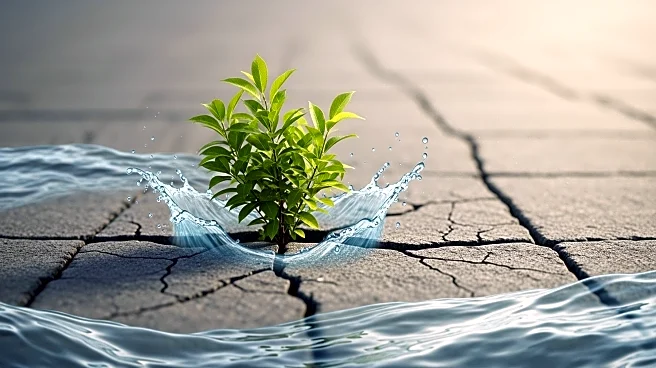What's Happening?
Greta Thunberg, the Swedish activist, is participating in the Global Sumud Flotilla (GSF), a group of 52 boats aiming to deliver humanitarian aid to Gaza. The flotilla's mission is to provide food and medicine to Palestinians, but it faces opposition from Israeli authorities. Israel has labeled the flotilla as a 'publicity stunt' and has previously intercepted similar attempts, citing concerns that aid might fall into the hands of Hamas. Thunberg has criticized these actions, arguing that the flotilla is a peaceful humanitarian mission. The flotilla has faced challenges, including suspected drone attacks, which have led Spain and Italy to deploy naval ships for assistance. Despite these obstacles, Thunberg remains committed to breaking what she describes as Israel's 'illegal and inhumane siege' on Gaza.
Why It's Important?
The flotilla's mission highlights ongoing tensions between humanitarian efforts and Israeli security concerns. The blockade of Gaza has been a contentious issue, with international aid agencies struggling to deliver necessary supplies. Thunberg's involvement brings significant attention to the situation, potentially influencing public opinion and international policy. The Israeli government's stance reflects its security priorities, aiming to prevent aid from empowering Hamas. However, the humanitarian crisis in Gaza, including reported famine, underscores the urgent need for effective aid distribution. The flotilla's efforts could pressure Israel to reconsider its blockade policies, impacting regional stability and humanitarian conditions.
What's Next?
The flotilla's journey continues amid international scrutiny and potential diplomatic interventions. If the flotilla reaches Gaza, it could set a precedent for future humanitarian missions, challenging Israeli policies. The involvement of naval ships from Spain and Italy suggests possible diplomatic negotiations to ensure safe passage. Israel's response to the flotilla's progress will be closely watched, with potential implications for its international relations and domestic policies. The situation may prompt further discussions on balancing security concerns with humanitarian needs, influencing future aid strategies in conflict zones.
Beyond the Headlines
The flotilla's mission raises ethical questions about the role of international activism in conflict zones. Thunberg's participation exemplifies the growing influence of non-state actors in global humanitarian efforts. The situation also highlights the complexities of international law, as accusations of illegal blockades and drone attacks surface. The flotilla's journey could inspire similar initiatives, encouraging civil society to address humanitarian crises where governments fall short. Long-term, this could shift the dynamics of aid distribution, emphasizing grassroots involvement and international collaboration.









